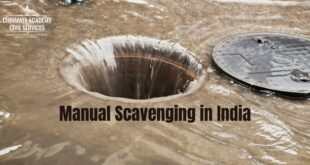- They know it is an inhuman and demeaning job rooted in caste-based discrimination and passed on to successive generations, but the sanitary workers continue to undertake manual scavenging as employers exploit them, and at times are cruel as well.
- The workers, the women especially, continue to do so to sustain the family and to educate their children so that the scourge ends with them.
- These are some of the facts known from the interviews taken among the sanitary workers in the State for a study by Social Awareness Society for Youth (SASY) on ‘The status of implementation of prohibition of employment as manual scavengers and rehabilitation (PEMSR) Act – 2013 in T.N’.
- SASY, a Dalit human rights organisation, studied 21 cases related to manual scavenging, sewer tank deaths, incidents of caste-based discrimination against sanitary workers and related incidents in government schools in Tamil Nadu in 2021-22.
- According to the report, majority of the cases were not recorded properly and would not have come to light but for the social media.
- “When the incident happens at a private company, they immediately give some money to the victims to prevent them from filing a case against them. Most of the cases come out only when a person dies while cleaning septic tanks.
- Many individuals from oppressed communities are into the occupation due to poverty and are involved in handling human and animal waste, especially in urban areas,” the report said.
- From the 21 fact-finding cases, the report found that the victims were mostly from Scheduled Castes.
- Among the 21 cases, 12 victims were from Arundhathiyar community, 11 from Adi Dravidar, four from Hindu Kuravar and one from ST.
- FIR was registered in 15 cases and only six cases were filed under PEMSR Act. Eight cases were filed under Prevention of Atrocities (SC/ST) Act, 2016. A total of 15 accused persons were arrested in nine cases.
- In seven cases, complaints were not given reportedly due to threats from the perpetrators. No charge-sheet was filed in any of these cases, and so no case came to trial, the report said.
- According to data from the National Commission for SafaiKaramcharis, in the last 29 years (1993-2022), a total of 989 members died in various parts of the country while cleaning underground sewage tanks.
- Tamil Nadu reported the highest number of deaths of manual scavengers. During the period from 2016 to 2020 in Tamil Nadu, 55 persons died while cleaning septic tanks.
- Chennai alone accounted for 12 such deaths, the highest in the State. In 2022, from January to July, 12 persons died in T.N.
‘Hazardous work’
- The workers were made to work in the most hazardous way. There was not enough protective gear and tech support and they continue to do it manually.
- Based on the study, recommendations have been made for procurement of machines for cleaning of sewers and septic tanks in major cities such as Chennai. Recommendations have been made for effective monitoring by local government to prevent such deaths.
- The study also stressed the need for bio-toilets to prevent such deaths of manual scavengers and increase in fund allocation for their rehabilitation.
SOURCE: THE HINDU, THE ECONOMIC TIMES, PIB
 Chinmaya IAS Academy – Current Affairs Chinmaya IAS Academy – Current Affairs
Chinmaya IAS Academy – Current Affairs Chinmaya IAS Academy – Current Affairs



